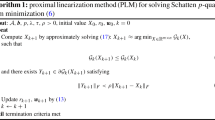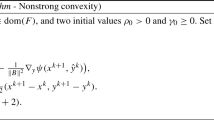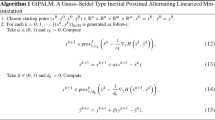Abstract
We consider a general ill-posed inverse problem in a Hilbert space setting by minimizing a misfit functional coupling with a multi-penalty regularization for stabilization. For solving this minimization problem, we investigate two proximal algorithms with stepsize controls: a proximal fixed point algorithm and an alternating proximal algorithm. We prove the decrease of the objective functional and the convergence of both update schemes to a stationary point under mild conditions on the stepsizes. These algorithms are then applied to the sparse and non-negative matrix factorization problems. Based on a priori information of non-negativity and sparsity of the exact solution, the problem is regularized by corresponding terms. In both cases, the implementation of our proposed algorithms is straight-forward since the evaluation of the proximal operators in these problems can be done explicitly. Finally, we test the proposed algorithms for the non-negative sparse matrix factorization problem with both simulated and real-world data and discuss reconstruction performance, convergence, as well as achieved sparsity.











Similar content being viewed by others
References
Alexandrov, T., Becker, M., Deininger, S. O., Ernst, G., Wehder, L., Grasmair, M., von Eggeling, F., Thiele, H., Maass, P.: Spatial segmentation of imaging mass spectrometry data with edge-preserving image denoising and clustering. J. Proteome Res. 9(12), 6535–6546 (2010)
Alexandrov, T., Kobarg, J. H.: Efficient spatial segmentation of large imaging mass spectrometry datasets with spatially aware clustering. Bioinformatics 27(13), i230–i238 (2011)
Attouch, H., Bolte, J., Svaiter, B. F.: Convergence of descent methods for semi-algebraic and tame problems: proximal algorithms, forward–backward splitting, and regularized Gauss–Seidel methods. Math. Program. 137(1-2), 91–129 (2013)
Berry, M. W., Browne, M., Langville, A. N., Pauca, V. P., Plemmons, R. J.: Algorithms and applications for approximate nonnegative matrix factorization. Comput. Stat. Data Analys. 52(1), 155–173 (2007)
Bolte, J., Sabach, S., Teboulle, M.: Proximal alternating linearized minimization for nonconvex and nonsmooth problems. Math. Program. 146(1-2), 459–494 (2014)
Brunet, J., Tamayo, P., Golub, T. R., Mesirov, J. P.: Metagenes and molecular pattern discovery using matrix factorization. Proc. Natl. Acad. Sci. 101 (12), 4164–4169 (2004)
Daubechies, I., Defrise, M., De Mol, C.: Sparsity-enforcing regularisation and ISTA revisited. Inverse Problems 32(10), 104001 (2016)
Daubechies, I., Defrise, M., Demol, C.: An iterative thresholding algorithm for linear inverse problems with a sparsity constraint. Comm. Pure Appl. Math. 57, 1413–1541 (2004)
Drakakis, K., Rickard, S., Fréin, R. D., Cichocki, A.: Analysis of financial data using non-negative matrix factorization. Int. Math. Forum 3, 1853–1870 (2008)
Engl, H. W., Hanke, M., Neubauer, A.: Regularization of inverse problems. Kluwer, Dordrecht (1996)
Engl, H. W., Kunisch, K., Neubauer, A.: Convergence rates for Tikhonov regularization of non-linear ill-posed problems. Inverse Problems 5(4), 523 (1989)
Greene, D., Cagney, G., Krogan, N., Cunningham, P.: Ensemble non-negative matrix factorization methods for clustering protein–protein interactions. Bioinformatics 24(15), 1722–1728 (2008)
Guo, Z., Lin, S., Shi, L.: Distributed learning with multi-penalty regularization. Appl. Comput. Harmon. Anal. 46, 478–499 (2019)
Hào, D. N., Quyen, T. N. T.: Convergence rates for total variation regularization of coefficient identification problems in elliptic equations I. Inverse Problems 27, 075008 (2011)
Hào, D. N., Quyen, T. N. T.: Convergence rates for total variation regularization of coefficient identification problems in elliptic equations ii. J. Math. Anal. Appl. 388 (1), 593–616 (2012)
Hoyer, P.O.: Non-negative sparse coding. In: Proceedings of the 2002 12th IEEE workshop on neural networks for signal processing, 2002, pp. 557–565. IEEE (2002)
Ito, K., Jin, B., Takeuchi, T.: Multi-parameter Tikhonov regularization. Methods and Applications of Analysis 18(1), 31–46 (2011)
Lee, D. D., Seung, H. S.: Learning the parts of objects by non-negative matrix factorization. Nature 401(6755), 788–791 (1999)
Lorenz, D.A.: Convergence rates and source conditions for Tikhonov regularization with sparsity constraints. J. Inv Ill-posed problems 16, 463–478 (2008)
Lorenz, D. A., Maass, P., Muoi, P. Q.: Gradient descent methods based on quadratic approximations of Tikhonov functionals with sparsity constraints: theory and numerical comparison of stepsize rules. Electron. Trans. Numer. Anal. 39, 437–463 (2012)
Mairal, J., Bach, F., Ponce, J., Sapiro, G.: Online learning for matrix factorization and sparse coding. J. Mach. Learn. Res. 11, 19–60 (2010)
Moreau, J.: Proximité et dualité dans un espace hilbertien. Bulletin de la Société Mathématique de France 93, 273–299 (1965)
Muoi, P. Q.: Reconstructing conductivity coefficients based on sparsity regularization and measured data in electrical impedance tomography. Inverse Problems in Science and Engineering 23(8), 1366–1387 (2015)
Muoi, P. Q., Hào, D. N., Maass, P., Pidcock, M.: Semismooth Newton and quasi-Newton methods in weighted l1-regularization. Journal of Inverse and Ill-Posed Problems 21(5), 665–693 (2013)
Muoi, P. Q., Hào, D. N., Maass, P., Pidcock, M.: Descent gradient methods for nonsmooth minimization problems in ill-posed problems. J. Comput. Appl. Math. 298, 105–122 (2016)
Muoi, P.Q., Hào, D.N., Sahoo, S.K., Tang, D., Cong, N. H., Dang, C.: Inverse problems with nonnegative and sparse solutions: Algorithms and application to the phase retrieval problem. Inverse Problems 34(5), 055007 (2018)
Nesterov, Y.: Gradient methods for minimizing composite objective function CORE discussion papers, 2007076, Université catholique de Louvain, Center for Operations Research and Econometrics (CORE (2007)
Sivananthan, S., et al.: Multi-penalty regularization in learning theory. J. Complex. 36, 141–165 (2016)
Smaragdis, P., Brown, J.C.: Non-negative matrix factorization for polyphonic music transcription. In: 2003 IEEE workshop on applications of signal processing to audio and acoustics, pp. 177–180. IEEE (2003)
Wang, W., Lu, S., Mao, H., Cheng, J.: Multi-parameter Tikhonov regularization with the l0 sparsity constraint. Inverse Problems 29(6), 065018 (2013)
Xu, Y., Yin, W.: A block coordinate descent method for regularized multiconvex optimization with applications to nonnegative tensor factorization and completion. SIAM J. Imaging Sci. 6(3), 1758–1789 (2013)
Acknowledgments
We gratefully thank Dr. Michael Becker (Bruker Daltonik) for doing the IMS measurement of the rat brain. Part of this work has been done during the stay of Pham Quy Muoi and Dinh Nho Hào at Vietnam Institute for Advance Study in Mathematics. The authors sincerely thank a referee for his/her constructive comments, which help us to improve the first version of this manuscript.
Funding
This research was financially supported by the German Federal Ministry of Education and Research (“KMU-innovativ: Medizintechnik” program, contract number 13GW0081), by The University of Da Nang - University of Science and Education under grant T2018-TD and by Vietnam National Foundation for Science and Technology Development (NAFOSTED) under grant number 101.02-2017.318.
Author information
Authors and Affiliations
Corresponding author
Additional information
Publisher’s note
Springer Nature remains neutral with regard to jurisdictional claims in published maps and institutional affiliations.
Rights and permissions
About this article
Cite this article
Pham, Q.M., Lachmund, D. & Hào, D.N. Convergence of proximal algorithms with stepsize controls for non-linear inverse problems and application to sparse non-negative matrix factorization. Numer Algor 85, 1255–1279 (2020). https://doi.org/10.1007/s11075-019-00864-x
Received:
Accepted:
Published:
Issue Date:
DOI: https://doi.org/10.1007/s11075-019-00864-x
Keywords
- Sparse matrix factorization
- Sparse non-negative matrix factorization
- Proximal fixed point iteration
- Alternating proximal iteration
- Non-smooth Optimization
- Non-linear inverse problems
- Sparsity regularization
- Non-negative sparsity regularization




